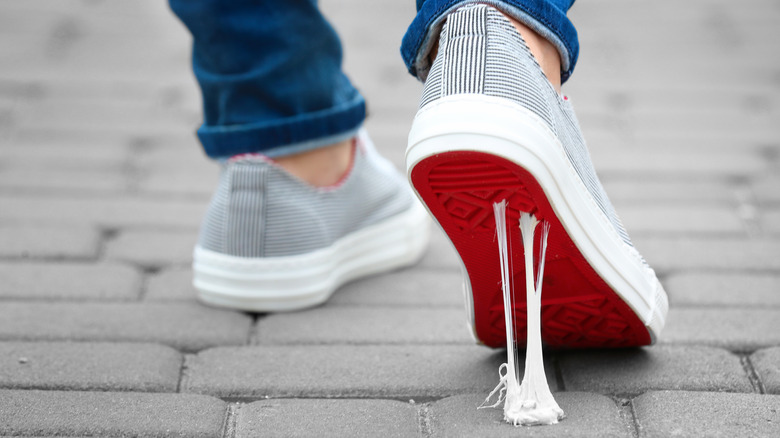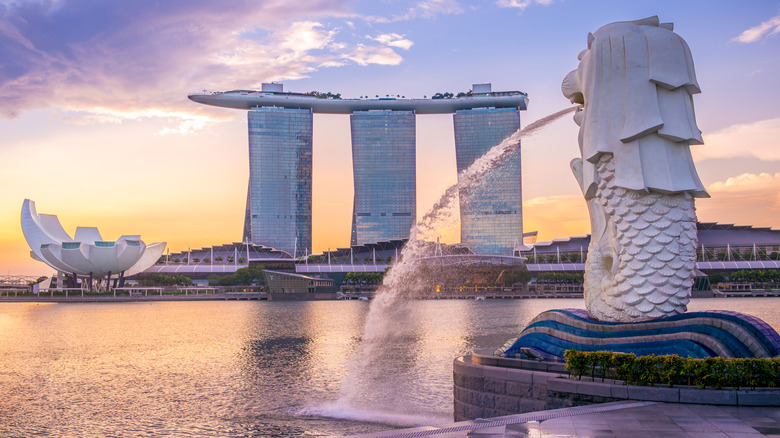Chewing Gum Is Banned In This One Asian Country
In Singapore, hotels like the Marina Bay Sands and Resort World Sentosa have casinos where you can gamble, but inbound tourists won't want to gamble on bringing chewing gum into the country. The very first thing the ICA, Singapore's Immigration & Checkpoint Authority, lists on its website under "Prohibited and Controlled Goods" is chewing gum, of all things. According to a 2015 BBC article, gum that's medicated or designated as "therapeutic" is an exception to the rule, but only dentists and pharmacists can sell it, and you need a prescription to buy it.
When you're on the go outside your hotel room in other vacation destinations — and you're trying to avoid a trip to the dentist — the lack of a convenient place to brush your teeth might have you accustomed to chewing sugar-free gum to keep plaque from building on your teeth. If you're the type of traveler who likes to pretend they're a soldier, maintaining their oral health with xylitol gum rations, that's fine, but you'll want to reconsider before engaging in that habit in Singapore. In the home of the Merlion, the ban on gum imports and sales goes back over 30 years. Like it or not, when you travel there, Singapore wants you, but not your gum.
A 'fine city'
Despite the ban, for the most part, gum is "largely legally chewable" in Singapore, per the BBC. Where a person would run into trouble is by spitting it out or leaving it stuck somewhere. The original catalyst for the ban to go into effect back in 1992 was when the city's Mass Rapid Transit (MRT) system began experiencing problems with vandals jamming up the train door sensors with gum.
GoAbroad.com notes that Singapore's current laws don't explicitly cover carrying gum for personal use, but disposing of it improperly could bring a fine of up to $1,000 for first-time offenders. This is one of the reasons that the country (and city-state) is sometimes jokingly referred to as a "fine city."
In a 2021 Time Out Index survey, Singapore ranked as the cleanest and greenest city in the world. The latter can be felt in its natural greenery, which is visible in places like the Southern Ridges, where the city's tallest pedestrian bridge, the Henderson Waves, curves through the trees. Yet it can also be felt when you're walking in the artificial Supertree Grove or braving the 72-foot-high Skywalk at Singapore's famous Gardens by the Bay.
The city prides itself on being clean and almost utopian, and as such, it has other laws against littering or even not flushing the toilet. While the Merlion may give the appearance of spitting water out of its mouth in a fountain stream, you don't want to do that with gum in Singapore.
No more gum or litter
Singapore is one of many great places to visit in Southeast Asia, and you shouldn't be discouraged from traveling there just because of the chewing gum ban. As silly and arbitrary as it might seem, it would be equally silly to avoid a country for something so trivial. That's especially true when the ban keeps you from ever getting gum stuck on your shoe or feeling a dry piece of it stuck under a table.
As far as Asian countries go, Singapore's gum and litter prohibitions are also no stranger than the dearth of public trash cans in cities across Japan, for instance. As Bloomberg notes, that, too, goes back to incidents on the train, insofar as it's a lingering effect of the 1995 sarin gas attacks on Tokyo's subway system. Even today, with a vending machine on practically every street corner in Tokyo, trash cans are few and far between, yet volunteer street-cleaning organizations manage to keep the litter in check. When you're out and about, it's as if you enter into a personal relationship with your trash, carrying it with you until you find somewhere to dispose of it and finally part ways.
In the same way, Singapore's chewing gum ban is rooted in its bad experiences with gum, and it calls on the individual's sense of personal responsibility — or at least their fear of punishment — to keep the city clean. Seriously, why risk paying a fine for a lousy stick of gum?


